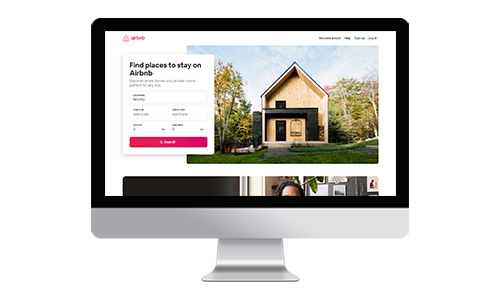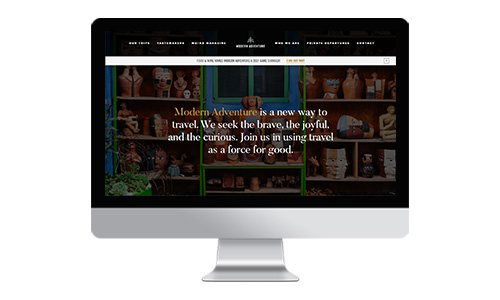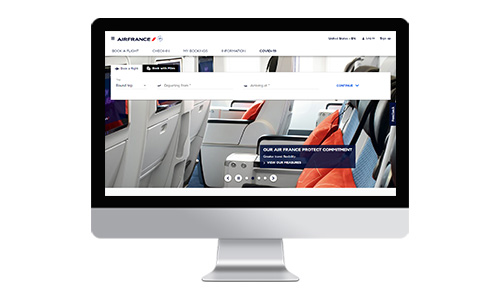There’s no one-size-fits-all way to run a successful company. But in the ever-evolving modern world, a digital strategy is vital, especially in the hospitality sector.
Roughly 83% of travel is booked online, and 70% of consumers research trips from a smartphone. What’s more, almost 50% of adults between 18 and 34 would rather spend money exploring the world than buying a home.
Get to Know the Top Hospitality Brands in the Digital Space
Whether it’s creative storytelling, a sustainable mission, virtual experiences, Facebook-led customer service, targeted ads, or curated accommodations, these hospitality brands are doing digital right.

1. Airbnb
Like most hospitality companies, Airbnb saw a drop in bookings in 2020 amid the coronavirus pandemic. However, the short-term rental site found a way to come out on top. Enter: Online Experiences.
People all over the world can participate in unique host-led experiences through the service without setting foot outside their homes. From fitness and cooking to date nights and group classes to historical tours and family-friendly activities, there’s something for everyone. This level of service and marketing adaptability sets them apart.
2. Booking.com
Travelers in the Millenial and Gen Z camps prioritize “Instagrammable moments” and seek out trip ideas from influencers. When conducting its marketing research, Booking.com found that over half of travelers want to visit somewhere their peers have never been.
What’s more, about a quarter want to set trends by posting about their trips, and almost a third choose accommodations based on what they think will photograph well for social media. With these findings in mind, the online travel agency showcases its most quaint lodging options to attract customers, like treehouses, yurts, tiny houses, igloos, and ryokans. Serving their target audience’s specific needs differentiates this hospitality service.

3. Modern Adventure
In recent years, as consumers reckon with their spending habits and carbon footprints, the “buy experiences, not things” movement has taken off. But how do people ensure their experiences are worth the money? That’s where Modern Adventure comes in.
The certified B Corp offers expertly curated itineraries designed to foster a sense of adventure, discovery, and personal enrichment while exploring the world. Whether it’s traversing through the French Alps, climbing Machu Picchu, celebrating Day of the Dead in Oaxaca, or a Costa Rican family adventure, each trip is outlined in enticing detail.
4. Wanderwell
When people venture out into the world, they want peace of mind knowing they won’t face a crisis—or at least if a catastrophe does occur, that they’ll be OK. Wanderwell is another B Corp in the hospitality industry offering not accommodations or transportation but rather trip protection and travel medical insurance.
The company does a lot more than set folks up with insurance plans, though. Wanderwell also prides itself as a social enterprise dedicated to sustainable business practices and environmental conservation.
As part of the brand’s content marketing strategy, this mission is front and center on its landing page to appeal to an increasingly eco-conscious market. The messaging is particularly effective in the hospitality industry, as people often feel more connected and protective of the world after seeing more of it.
 5. Air France
5. Air France
Air France flies to more than 200 destinations in nearly 100 countries across six continents. The flag carrier’s hospitality marketing strategy relies heavily on the customer service it provides through social media.
Facebook and Twitter have proven to be crucial in connecting with fliers, especially those seeking quick responses to their travel questions. Through these platforms, Air France has made itself digitally accessible 24 hours a day, seven days a week, and in turn, developed an impressive social media following and a reputation for good customer service.
6. Hopper
More than 90% of businesses in the U.S. use social media as part of their marketing plans—because it works. Take Hopper, for example. The popular travel app uses paid Instagram Stories to encourage young adults to search for destinations and book trips.
Once prospective travelers make their way over to the app, a fine-tuned algorithm generates highly precise, personalized recommendations. The algorithm is impressive on its own, but with the help of its paid media campaign, Hopper saw an 80% uptick in bookings for new users.
Hospitality Digital Marketing Consulting
At Mad Fish Digital, we work with hospitality brands to help them expand their bookings and find their next happy customers. If you need help with paid media, SEO, content management, design, or social media, our digital marketing agency would love to hear from you. Get in touch to learn more.

